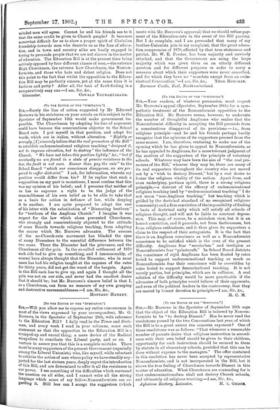(TO THE EDITOR OF THE "SPECTATOR.")
SIR,—Surely the line of action suggested by Mr Edmund Burrows in his strictures on your article on this subject in the Spectator of September 13th would make government im- possible. The Churchman by adopting his line of argument could have become the conscientious objector to the School Board rate. I put myself in that position. and adopt his words, which are in italics, without alteration. "Rightly or wrongly, Llisincerely believe that the real promoters of the Bill" to establish undenominational religious teaching "designed it, not to improve education; but to destroy" the influence of the Church. " We have not taken this position lightly," &c.," but if eventually we are found in a state of passive resistance to the law, the fault is not ours. Sooner than pay the rate" to the School Board "which our consciences disapprove, we are pre- pared to suffer dish aint." I ask, for information, wherein my position would differ from his ? If he replies that such a supposition on my part is monstrous, I must confess that this was my opinion of his belief ; and I presume that neither of us has so supreme a right to be the judge of the reasonableness of his own belief as to be able to take that as a basis for action in defiance of law, while denying it to another. I am quite prepared to adopt the rest of his letter with the substitution of "Dissenting brethren" for "brethren of the Anglican Church." I imagine it was respect for the law which alone prevented Churchmen, who strongly and conscientiously objected to the attitude of some Boards towards religions teaching, from adopting the course which Mr. Burrows advocates. The success of the no-Church-rate movement has blinded the eyes of many Disienters to the essential difference between the two cases. There the Dissenter had the grievance, and the Churchman all the gain. In the so-called settlement of 1870 each side had to give up something, and I (unreasonably, of course) have always thought that the Dissenter, who in most cases has had his religion taught at the expense of the rates for thirty years, did not get the worst of the bargain. Again in this Bill each has to give up, and again I thought all the gain was not on our side, and never had the smallest desire that it should be; but Mr. Burrows's sincere belief is that I, as a Churchman, can form no measure of any own grasping and destructive unreasonableness.—I am, Sir, Sec.,
MONTAGU HAMLET.










































 Previous page
Previous page